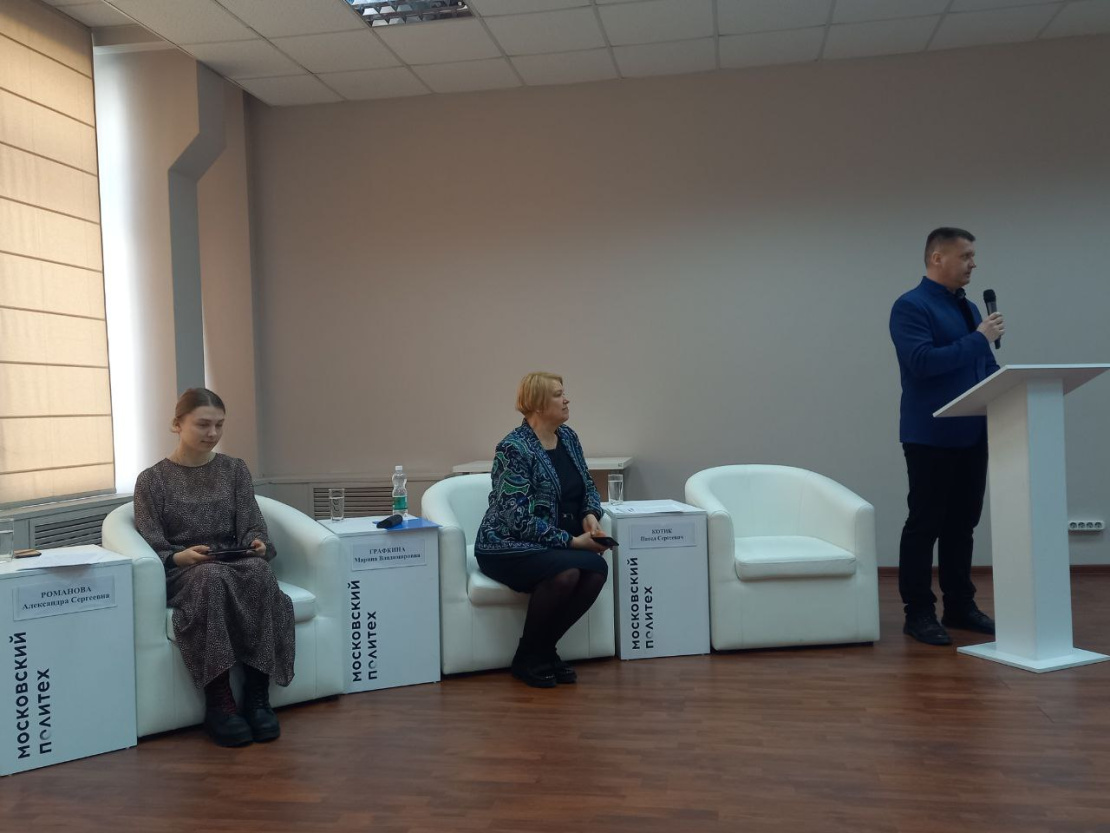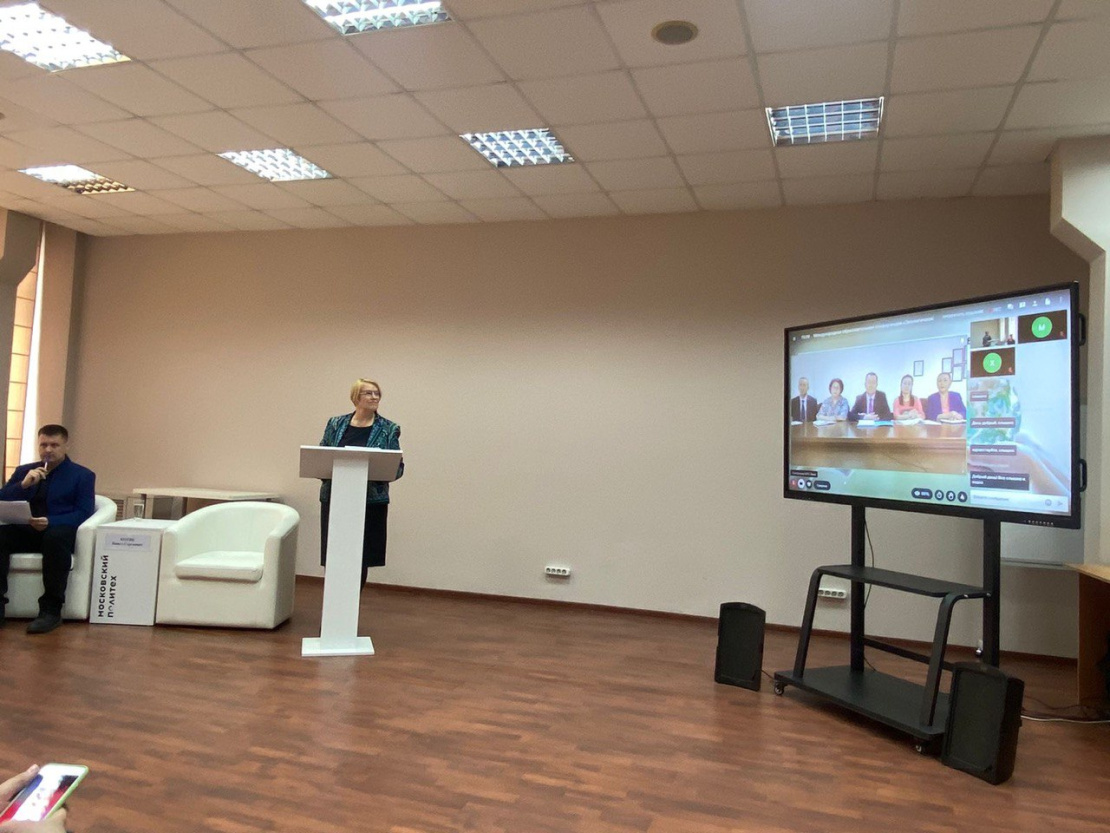

Participants of the International Educational Conference “Ecological Safety and Sustainability of Social Development”, that took place on March 22, 2024 at Moscow Polytech, discussed current issues on the topic.
The purpose of the conference is implementation of the action plan on the “Strategy for the development of education in the Russian Federation for the period up to 2025”, approved by a decree of the Government of the Russian Federation. The conference also included discussions of conceptual foundations of the Russian ecological education, the mechanisms of forming the system of ecological education of the younger generation and the issues of scientific research in the sphere of ecological and occupational safety.
In her speech, Professor of the Department "Environmental Safety of Technical Systems" of Moscow Polytech, doctor of technical science, laureate of the Government of the Russian Federation Award in the field of education, honorary worker of higher education Marina Grafkina noted the importance of the conference theme and the interest revealed towards it from the scientific and student community. She also made a presentation on the “Ecological Education at Moscow Polytechnic University”. In her report, the lecturer talked about education programs in "Technosphere safety" (20.00.01), "Environmental and Industrial Safety" (20.03.01), "Environmental Biotechnologies", "Safety of Technological Processes and Productions" and "Supervision and Inspection Activities in the Field of Labor" "Environmental Safety in Industry" (20.04.01).
“We received 150 applications for the conference, including 28 from abroad. In Russia, special attention is paid to the issues of ecological safety and sustainability of social development. The Message of the President of the Russian Federation to the Federal Assembly (February 29, 2024) says that by 2030 all Russia’s regions should become economically more self-sufficient. Taking into account modern ecological standards, public transport will be developed, the incentives will be created for businesses to introduce green technologies and transition to a closed-loop economy. In fact, in Russia the modern waste management industry has been established from scratch. For their recycling and utilization, 250 enterprises have been founded, 128 large landfills in the cities organised, and 80 objects of accumulated environmental damage have been closed. The discussion of these and other problems will be useful both for educational and upbringing processes”, said professor of the of the Department "Environmental Safety of Technical Systems" Marina Grafkina.
Zhunisov Aybabek Talgatovich, First Vice-President of the Kyzyl Orda Open University, PhD of Technical Sciences, professor underlined the role of Moscow Polytech in development of modern educational, scientific and technical infrastructure. He also noted that for achieving sustainable system of ecological safety in society it is necessary to develop relevant cultural values, aimed at protection and preservation of the environment.
Nilufar Pimirkulovna Dustamamatova, PhD, senior lecturer at the Department of Foreign Languages of the Tashkent State University of Uzbek Language and Literature named after Alisher Navoi, made a presentation on the "Environmental culture of the Uzbek people for nature protection".
Marina Mozheyko, doctor of Philosophy, professor of the Department of Philosophy, History and Methodology of Education of State educational institution "Republican Institute of Higher Education”, talked about formation of ecological conscience in culture of various nations, as well as about the role of eastern and western cultures.
Nodira Bakhodirzhanovna Gaibnazarova, Head of the Staff Labor Protection Department of the Federation of Trade Unions of Uzbekistan, PhD in Philosophy, and an expert in labor issues, in her video message discussed the priority fields of the “Uzbekistan 2030” Strategy. She also shared hew view on state policy and the system of public control over labor protection in the Republic of Uzbekistan, incorporating the “concept of decent work”, creation of “green” jobs, improvement of the employees working conditions, and reducing environmental risks.
Alexandra Romanova (a postgraduate student at Moscow Polytech) and her sister Alina Romanova (a master of Kaliningrad Technical University) made a presentation on the “Evaluation of Ecological Situation in Kaliningrad Region”, in which they told about historical, natural, cultural and social aspects of the region, about how they affect ecological situation.
According to the organizers, Evgenia Gulyaeva, Head of the Department of Linguistics and Intercultural Communication, and Yulia Semikina, Associate Professor of the Department of Linguistics and Intercultural Communication at the VIU RANEPA, became active participants of the conference.
After the Plenary session, the conference continued its work by sections:
Section 1: “Ecology of Culture: Between the Slogan and Reality”;
Section 2. “Assessment of Ecological Status of Regions”;
Section 3. “Green Economy as the Model of Sustainable Development”;
Section 4.” Development of the Territories Social Potential in the Context of Ensuring Environmental Safety”;
Section 5. “Business Facing Global Environmental Problems: Solution Tools and Mechanisms. Ecological Innovations”;
Section 6. “Waste Recycling and Treatment as the Strategy of Sustainable Development of a Closed-loop Economy";
Section 7. “Environmental Safety of Technical Systems”;
Section 8. “Labor Protection in the Modern World”;
Section 9. “Economic Aspects of Environmental Safety: Russian and Foreign Experience”.
The conference was attended by students and teachers from Russia, Belarus, Uzbekistan, Kyrgyzstan, Abkhazia, Tajikistan, Vietnam, India, China, Ireland, South Korea, Syria, Morocco, Nigeria, Angola, Congo, The People's Republic of Bangladesh and other countries of the world. All participants will receive certificates of participation, and the winners will be awarded diplomas.











